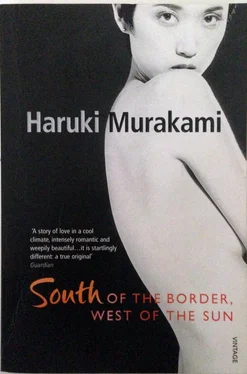That’s why I wasn’t paying much attention to her. Sure, I checked her out when she first came in and gave her a glance every once in a while. She wore just a touch of makeup, and a pricey-looking outfit–a blue silk dress, with a light-beige cashmere cardigan. A cardigan as delicate-looking as an onion skin. And on the counter she’d placed a handbag that matched her dress perfectly. I couldn’t guess her age. Just the right age, was all I could say.
Her beauty took your breath away, but I didn’t figure her for a movie star or a model. Those types did frequent my bar, but you could always tell they were conscious of being on public display, the unbearable me ness of being clinging to the air around them. But this woman was different. She was completely relaxed, totally at ease with her surroundings. She rested her chin in her hands on the counter, absorbed in the piano trio’s music, all the while sipping her cocktail as if lingering over a particularly well-turned phrase. Every few minutes, she glanced in my direction. I could sense it, physically. Though I was positive she wasn’t really looking at me.
I had on my usual outfit—Luciano Soprani suit, Armani shirt and tie. Rossetti shoes. Believe it or not, I wasn’t the type to worry about clothes. My basic rule was to spend the bare minimum on them. Outside of work, jeans and a sweater did me fine. But I did have my own little philosophy of doing business: I wore the kind of clothes I wanted my customers to wear. Doing so, I found, put the staff just that much more on their toes and created the sort of elevated mood I was aiming for. So every time I came to the bar, I made absolutely sure to wear a nice suit and tie.
There I sat, then, checking to make sure the cocktails were mixed correctly, keeping an eye on the customers, and listening to the piano trio. At first the bar was fairly packed, but after nine it started raining, and the number of customers tailed off. By ten only a handful of the tables were occupied. But the woman at the counter was still there, alone with her daiquiris. I started to wonder about her more. Maybe she wasn’t waiting for someone, after all. Not once did she glance at her watch or at the entrance.
Finally she picked up her bag and stepped down from her stool. It was nearly eleven. If you wanted to take the subway home, now was the time to get a move on. Slowly, ever so casually, though, she made her way over to me and sat on the adjacent stool. I caught a faint whiff of perfume. Settling down on the stool, she took a pack of Salems from her bag and put one in her mouth. I caught all this out of the corner of my eye.
“What a lovely bar,” she said to me.
I looked up from the book I’d been reading and looked at her uncomprehendingly. Just then something hit me—hard. As if the air suddenly lay heavy on my chest.
“Thanks,” I said. She must have known I was the owner. “I’m happy you like it.”
“I do, very much.” She looked deep into my eyes and smiled. A wonderful smile. Her lips spread wide, and small, fetching lines formed at the corners of her eyes. Her smile stirred deep memories—but of what?
“I like your music too.” She pointed to the piano trio. “Do you have a light?” she asked.
I had neither matches nor a lighter. I called to the bartender and had him bring over a book of the bar’s matches. And I lit her cigarette for her.
“Thanks,” she said.
I looked at her straight on. And I finally understood.
“Shimamoto,” I rasped.
“It took you long enough,” she said after a while, a funny look in her eyes. “I thought maybe you’d never notice.”
I sat there speechless, gawking at her as though I were in the presence of some high-tech precision machinery I’d only heard rumors of. It was indeed Shimamoto in front of me. But I couldn’t yet grasp the reality of it. I’d been thinking of her for so very, very long. And I was sure I’d never see her again.
“I love your suit,” she said. “It’s quite becoming.”
I nodded wordlessly. The words just wouldn’t flow.
“Know something, Hajime? You’re much handsomer than you used to be. And a lot better built.”
“I swim a lot,” I finally managed to say. “I started in junior high, and I’ve been swimming ever since.”
“Swimming looks like so much fun. I’ve always thought so.”
“It is. But if you practice, anyone can learn, you know,” I said. As soon as the words left my mouth, I remembered her leg. What the hell are you talking about? I asked myself. I was flustered, fumbling for the right thing to say. But the words eluded me. I rummaged around in my suit pockets for a pack of cigarettes. And then remembered. I’d quit smoking five years before.
Shimamoto watched me silently. She raised her hand and ordered another daiquiri, giving the biggest smile. A truly beautiful smile. The kind of smile that made you want to wrap up the whole picture for safekeeping.
“You still like blue, I see,” I said.
“Yes. I always have. You have a good memory.”
“I remember almost everything about you: the way you sharpen your pencils, the number of lumps of sugar you put in your tea.”
“And how many would that be?”
“Two.”
She narrowed her eyes a bit and looked at me.
“Tell me something, Hajime,” she began. “That time about eight years ago—why did you follow me?”
I sighed. “I couldn’t tell if it was you or not. The way you walked was exactly the same. But there was also something about it that didn’t seem like you. I tailed you because I wasn’t sure. Tailed isn’t the right word. I was just looking for the right moment to talk with you.”
“Then why didn’t you? Why didn’t you just come right out and see if it was me? That would have been faster.”
“I don’t know, myself,” I answered. “Something held me back. My voice just wouldn’t work.”
She bit her lip a little. “I didn’t notice then that it was you. All I could think was that someone was following me, and I was afraid. Really. I was terrified. But once I got in the cab and had a chance to calm down, it came to me. Could that have been Hajime?”
“Shimamoto-san, I was given something then. I don’t know what relationship you have with that person, but he gave me—”
She put her index finger to her lips. And lightly shook her head. Let’s not talk about that all right? she seemed to be saying. Please , don’t ever bring it up again .
“You’re married?” she asked, changing the subject
“With two kids,” I replied. “Both girls. They’re still little.”
“That’s great. I think daughters suit you. I can’t explain why, but they do.”
“I wonder.”
“Yes— somehow.” She smiled. “But at least you didn’t have an only child.”
“Not that I planned it. It just turned out that way.”
“What does it feel like? I wonder. To have two daughters.”
“Frankly, a little strange. More than half the children in my older girl’s nursery school are only children. The world’s changed since we were kids. In the city, only children have become more the rule, not the exception.”
“You and I were born too soon.”
“Maybe so,” I said. “Perhaps the world’s drawing closer to us. Sometimes when I see the two of them playing together at home, I’m amazed. A whole other way of raising children. When I was a child, I always played alone. I thought that was how all kids played.”
The piano trio wound up its version of “Corcovado,” and the customers gave them a hand. As always, as the night wore on, the trio’s playing grew warmer, more intimate. Between numbers the pianist drank red wine, while the bassist smoked.
Читать дальше












